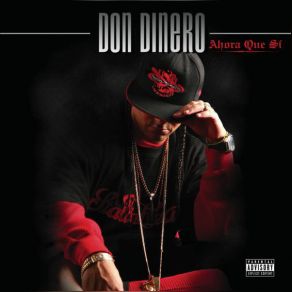Ahora Que Si
Download links and information about Ahora Que Si by Don Dinero. This album was released in 2005 and it belongs to Hip Hop/R&B, Rap, Latin genres. It contains 17 tracks with total duration of 01:02:52 minutes.

|
|
|---|---|
| Artist: | Don Dinero |
| Release date: | 2005 |
| Genre: | Hip Hop/R&B, Rap, Latin |
| Tracks: | 17 |
| Duration: | 01:02:52 |
| Buy it NOW at: | |
| Buy on iTunes $9.99 | |
| Buy on iTunes $9.99 | |
| Buy on Songswave €2.15 | |
Tracks
[Edit]| No. | Title | Length |
|---|---|---|
| 1. | Intro Olocum | 1:23 |
| 2. | Ahora Que Si | 3:53 |
| 3. | De la Nada | 3:34 |
| 4. | Si No Hay Pa Mi | 3:34 |
| 5. | Arte de la Calle | 4:23 |
| 6. | Isla Bonita | 3:34 |
| 7. | Nada Queda Igual | 4:16 |
| 8. | Aveces | 4:12 |
| 9. | Son de la Loma | 4:09 |
| 10. | Pastelito | 3:44 |
| 11. | Mr. Money | 3:18 |
| 12. | No Es Lo Mismo | 5:09 |
| 13. | Libertad | 3:38 |
| 14. | Nada Mas | 4:09 |
| 15. | Cuantas Veces | 3:36 |
| 16. | Outro | 2:02 |
| 17. | El Vacilon Skit | 4:18 |
Details
[Edit]While Universal Latino was quick to tag Don Dinero "el 'Godfather' del hip-hop latino," such an accolade is a bit misleading. Plenty of Latinos had embraced hip-hop prior to Dinero's early-2000s breakthrough, chief among them the mighty Control Machete, not to mention the legion of reggaeton performers like Tego Calderón and Vico-C who could rap circles around most mainstream American rappers, albeit en español and to reggaeton beats, not hip-hop. And while stateside rappers like Cypress Hill, Big Pun, Nore, Fat Joe, and Lil Rob were undoubtedly Latino plus hip-hop, they didn't rap in Spanish primarily. So technically, Dinero is the first of his kind — well, he was, that is, because by the time he returned with his second album, Ahora Que Sí, in 2005, he had a number of upstarts to contend with, most notably the Lil Jon-sponsored Pitbull. All of this qualification aside, Dinero certainly sounds unique. Unlike Cypress Hill, Big Pun, et al., his primary language is Spanish and he flows incredibly well en español, right up there with his reggaeton peers down there in the 51st state. And unlike Control Machete, Tego, et al., he raps in English, too, and does so just as well as he does in Spanish — and too, his beats are clearly hip-hop. The best showcase of his credentials is the album-opening title track, where he brazenly switches back and forth between Spanish and English, dropping shrewd hip-hop references like Jay-Z's 40-40 club and "pounds of haze" to show you that he's down. The other standout showcase is the album's lead single, "Arte de la Calle," where again he flip-flops languages, making firm his association with hip-hop, not Latin music. Taken as a whole, Ahora Que Sí is a remarkable statement of purpose. Not only is it yet more evidence that Latinos are a demographic presence to be reckoned with in the United States at the turn of the century, but it also helps to break down stereotypes of both Latinos and hip-hop. And too, it's a solid album, boasting another standout moment in "Son de la Loma," a Celia Cruz collaboration previously released in 2004. Granted, Ahora Que Sí isn't quite as earth-shattering as some fans had been anticipating. In particular, Dinero would benefit from more "hip-hop" producers; the beatmakers here are fine but a bit faceless — no DJ Premiers or Swizz Beatzes, for sure. Still, there's so much to celebrate here on Ahora Que Sí that such quibbling seems inappropriate, if not downright unnecessary. And besides, this is only Dinero's second album. Perhaps by his next go-round, he indeed may have the likes of DJ Premier or Swizz Beatz backing him.